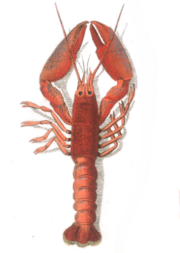Homarinus
| Cape lobster | |
|---|---|
 |
|
| Herbst's 1792 illustration | |
| Scientific classification | |
| Kingdom: | Animalia |
| Phylum: | Arthropoda |
| Subphylum: | Crustacea |
| Class: | Malacostraca |
| Order: | Decapoda |
| Family: | Nephropidae |
| Genus: |
Homarinus Kornfield, Williams & Steneck, 1995 |
| Species: | H. capensis |
| Binomial name | |
|
Homarinus capensis (Herbst, 1792) |
|
| Synonyms | |
|
|
The Cape lobster, Homarinus capensis, is a species of small lobster that lives off the coast of South Africa, from Dassen Island to Haga Haga. Only a few dozen specimens are known, mostly regurgitated by reef-dwelling fish. It lives in rocky reefs, and is thought to lay large eggs that have a short larval phase, or that hatch directly as a juvenile. The species grows to a total length of 10 cm (3.9 in), and resembles a small European or American lobster; it was previously included in the same genus, Homarus, although it is not very closely related to those species, and is now considered to form a separate, monotypic genus – Homarinus. Its closest relatives are the genera Thymops and Thymopides.
The Cape lobster is endemic to South Africa. It occurs from Dassen Island, Western Cape in the west to Haga Haga, Eastern Cape in the east, a range of 900 kilometres (560 mi). Most of the known specimens were regurgitated by fish caught on reefs at depths of 20–40 metres (66–131 ft). This suggests that the Cape lobster inhabits rocky substrates, and may explain its apparent rarity, since such areas are not amenable to dredging or trawling, and the species may be too small to be retained by lobster traps.
Homarinus capensis is considerably smaller than the large northern lobsters of the Atlantic Ocean, Homarus gammarus (the European lobster) and Homarus americanus (the American lobster), at 8–10 centimetres (3.1–3.9 in) total length, or 4–5 cm (1.6–2.0 in) carapace length. Accounts of the colouration of H. capensis are very variable, from tawny, red or yellow to "a rather dark olive", similar to Homarus gammarus.
...
Wikipedia

